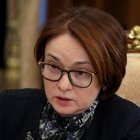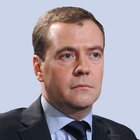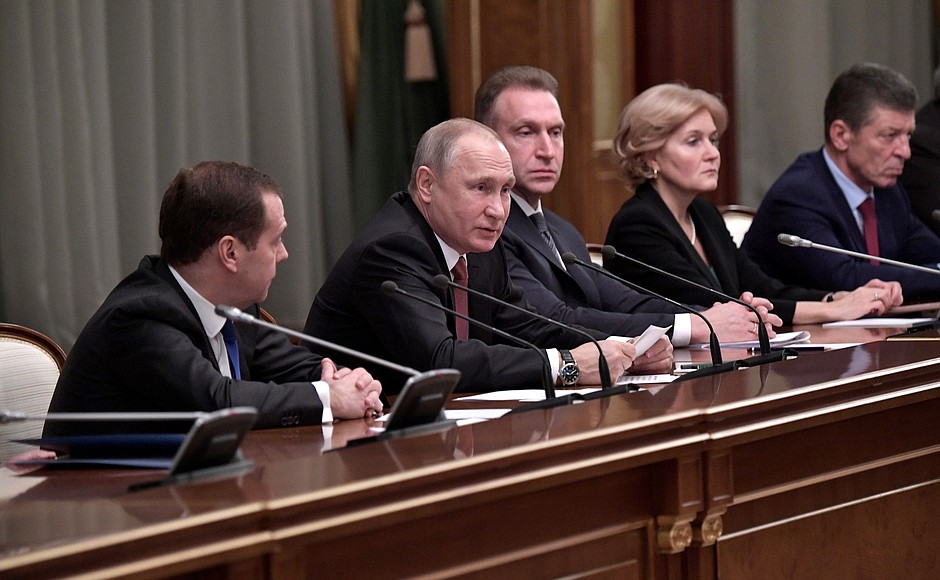
President of Russia Vladimir Putin: Good afternoon, colleagues.
As per our tradition, we have only one issue on the agenda of our meeting today. I would like to wish you a happy New Year and all the best, as well as happiness and health to you and your families and loved ones.
I would like to say that we have been working together not just this past year but for over five years. It was a difficult period for the country and for those who were responsible, each in his or her particular position, for continued development and for overcoming the difficulties that the global and Russian economy faced. I am referring to the well-known problems created by foreign restrictions and the downturn on the markets of our traditional exports.
I would like to say that the Russian Government has been doing more than its best. In fact, you have resolved the issues that faced our economy. In this connection, I would like to thank the Prime Minister and his deputies and the heads of ministries and agencies on what they have done in the past few years, as well as the staff of the Executive Office and all those who worked together for our common cause and to a common end.
Of course, there were problems as well and I will talk about them now, but I would like to note positive things before I do this. One of them without any doubt… Elvira Nabiullina [Governor of the Central Bank] is here, and using her presence, I would like to say that this is the work of the Central Bank. This achievement would not have been possible without the Government’s economic bloc. We have managed to have the lowest inflation rate in Russia’s entire history, which is obviously an achievement of the last few years and gives us grounds to hope that this macroeconomic foundation will facilitate our further economic development.
The dependence of the federal budget on oil prices has been reduced, and in general, the Russian economy is less susceptible to all kinds of external shocks and influence. We have scored success in stepping up our efforts to improve the business climate. There are many outstanding issues in this area as well, but our progress is obvious.
The import substitution and export support programmes have produced a tangible effect. Indicatively, the domestic agro-industrial sector has become our largest non-energy exporter. Quite recently, this was hard to imagine (we often talk about this and have every reason to do so), but now it is a fait accompli.
I am not referring only to the agro-industrial sector. Large-scale construction sites and industrial, infrastructure projects have been launched. I will not mention all of them but just a few: this is the well-known Crimean Bridge, the Vostochny Cosmodrome, the Moscow Central Ring, the Western High-Speed Diameter in St Petersburg, the Yamal-LNG project and a number of other modern high-tech enterprises.
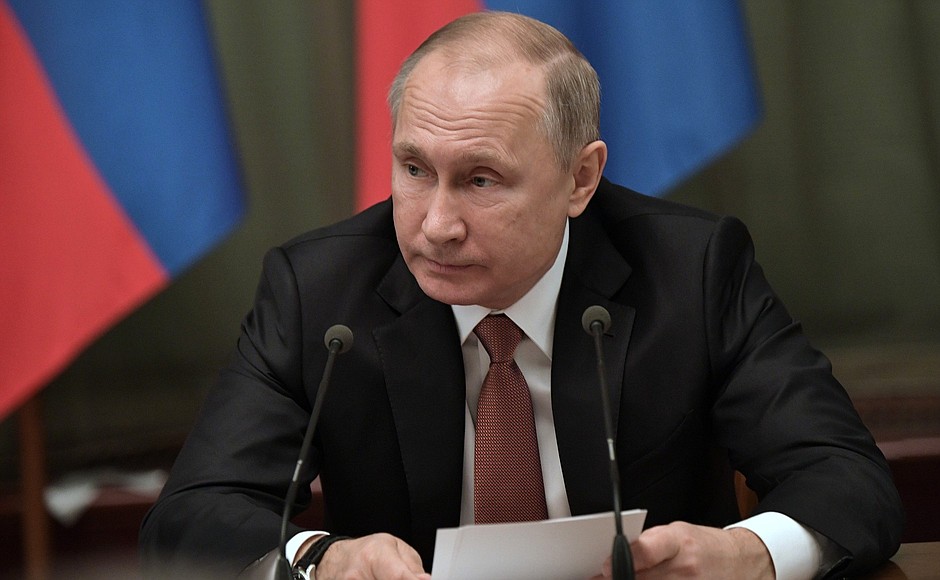
I would like to mention the results that have directly influenced the living standards of people: tens of thousands of people have been moved from dilapidated housing and the issue of waiting lists for kindergartens has practically been resolved.
As for resettlement from dilapidated housing, we understand that we had certain time constraints, but this does not mean that the task has been fully carried out. We still have people who are residing in housing that is not fit for living in. Let us be quite straight about this. However, I must admit that the task that we set forth to fulfil over a certain period of time and that we received from the past has been resolved. Nevertheless, we must obviously move on.
As I have already said, the problem of waiting lists for kindergartens has been practically resolved. Now we are facing another task though, and Mr Medvedev has recently recalled it in public. We now have a waiting list for nurseries. This is not just a programme that will help bring up children. It is closely linked with demographics and will give young women more free time, allowing them to work. As we well know this means much in the decision making of young couples wanting to start a family and have children.
The programme for building new schools and creating modern school places has been launched.
The quality of government services has been changed by the formation of a network of multi-purpose integrated centres. They are now functioning all over the country. This is important for people and I am pleased to say they do not exist just on paper but they are really working.
However, as I mentioned earlier, there are still many unsolved issues, and the main one, as we are all well aware, is the large number of people living on incomes below the subsistence level. In 2000, we had almost one-third of the population living like that, more than 40 million people. Today, this figure is down to about 20 [million], but there was a point in time several years ago when it dropped to 15 million. The economic crisis of recent years, lower oil prices, and some other reasons, including external restrictions, have done their dirty deed, and the number of people living below the poverty line has unfortunately increased.
Our goal is not just to reach the best indicators of recent years, but also, as I recently said at the United Russia party congress, to target poverty. We discussed this issue with the Finance Minister, and the Finance Ministry also agrees: we need to stick to the salary parameters that have been achieved recently or must be achieved in 2018 with regard to the level of salaries in the public sector. I mean teachers at schools and higher educational institutions, doctors and healthcare in general, and everything that we did in this sphere in recent years.
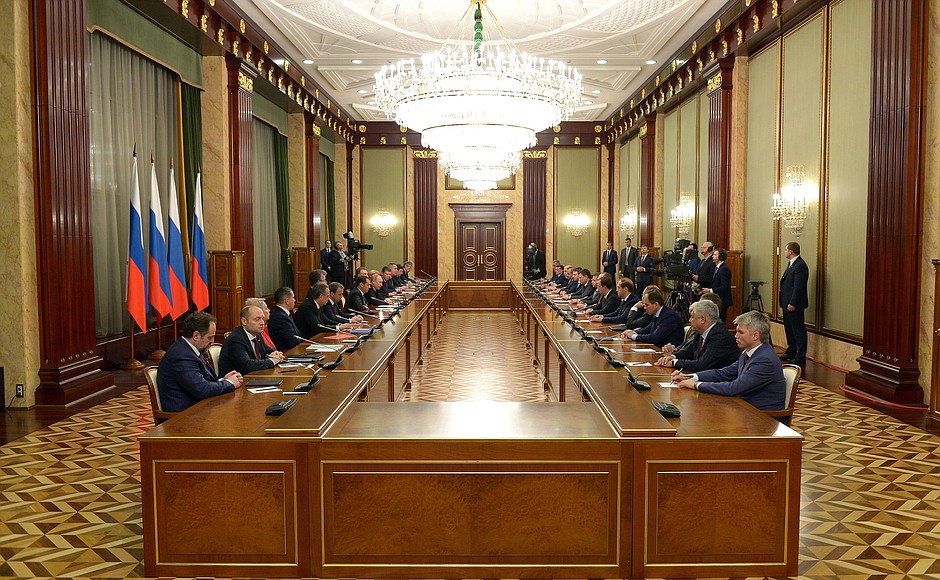
We can slip very quickly without knowing it actually happened if we do not focus on it at all times. In any case, the parameters that we are about to reach in 2018 must be complied with in the years to come, please keep that in mind.
Of course, it is imperative, as I have just said, to finish fulfilling the May Executive Orders. On some of them, work must be completed in 2018. It is necessary to achieve tangible results from implementing the projects aimed at increasing productivity, developing modern education and the healthcare, increasing housing affordability, and forming a modern people-friendly urban environment.
We have adopted a number of additional decisions designed to develop our regions. In addition, officials with successful experience in the Government, ministries, and departments are now working in the regions. Please keep comparing notes with the top officials of the regions who are well aware of the local issues, maintain close contacts and dialogue with them, and continue to work with the parliament in the same way, because the overall result depends on mutual understanding between authorities at all levels.
We have done much on state defence procurement and acquisition, and I would like to thank the Ministry of Industry and Trade for this. This was done in cooperation with the Defence Ministry and law-enforcement agencies in general. This work was done on a very large scale and done well. I hope this will affect not only the state’s defence capability but also civilian sectors of production.
We are facing this task, and we are well aware of this. It is necessary to monitor this attentively and to help relevant enterprises and industries to make sure that when state procurement decreases, the production assets in which we invested about three million rubles are not idle but work efficiently.
Needless to say, we must aim for the world’s highest standards so that civilian products are in demand not only on our domestic market but may be exported abroad. Mechanisms to achieve this are well known, and we need to make sure they are used promptly and productively and receive the required resources.
We are still facing many tasks that we must resolve as I have already said, but I am sure that if we keep up the style of work that has taken shape in the past few years, we will resolve the tasks facing the country and will do this even better than before.
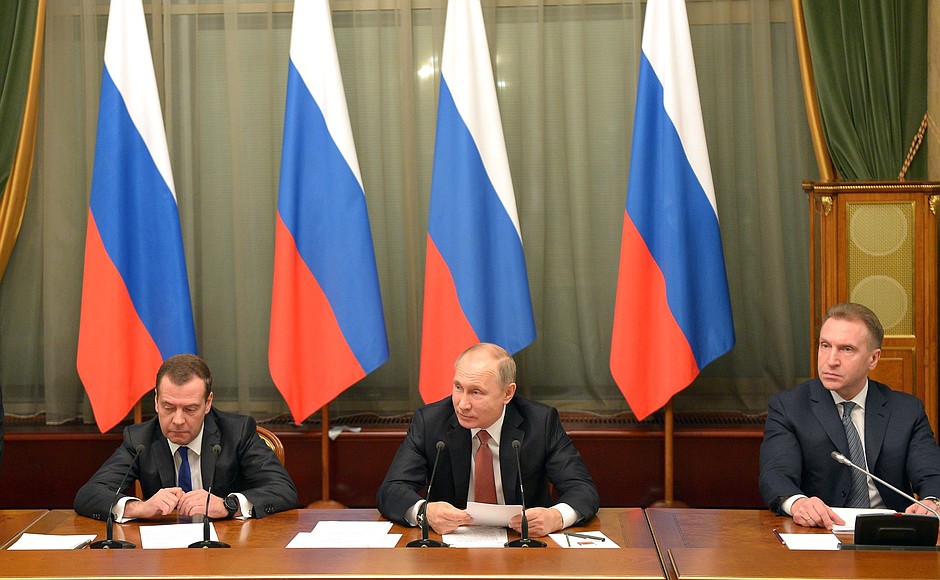
Let me wish you a Happy New Year once again, thank you for our joint work and wish you all the best.
Prime Minister Dmitry Medvedev: Mr President, colleagues,
First of all, I would like to thank you, Mr President, on behalf of the Government for your support that we feel continuously, and for the assessments that you have just given. This is not only pleasant but also helps us to better formulate our strategic tasks and determine priorities in our daily work.
The President has already spoken about the main events and achievements of the outgoing year and the past few years and expressed his opinion on current problems.
Naturally, one of the Government’s main tasks is not just to consolidate positive trends. The President has just mentioned them: GDP growth, record-low inflation, and the general sustainability of the financial system with a minimum budget deficit.
However, of course, these trends should be consolidated by creating incentives for the development of business and new jobs. We must resolve the most urgent problem about which the President has just spoken – increasing real incomes. In this context, the situation remains fairly complicated.
Of course, the Government is doing all it can to complete its work on the President’s Executive Orders of May 7, 2012, where some decisions still have to be made. We will carry out the package of demographic measures that the President has just announced. I must say that at the Government meeting we have just allocated almost 21.5 billion rubles for those families in the regions that will soon have their first baby. In other words, we have already started working on this package.
Understandably, the forthcoming year is special for this country. The main political event is the presidential election. This is an important period not only for the participants of the election campaign but also for the entire system of government power. I am sure the members of the Government and heads of departments will do everything to go through this period properly.
On behalf of the Government, I would like to wish you, Mr President, success in implementing your plans and victory in the presidential election.
Vladimir Putin: Thank you very much.
Dmitry Medvedev: Happy New Year!
Vladimir Putin: Thank you.
There is one more point to remember. When we recently met with business representatives and discussed issues linked with support for Russian business with some colleagues, many proposals were made. One of them is to extend the amnesty of capitals and another – not to levy 13 percent if business abroad is stopped and transferred to Russian jurisdiction. I would like to ask the Ministry of Finance and the Ministry of Economic Development to work on these proposals and Mr Medvedev to support this.
Considering that external restrictions continue, we see that many business people want to return to our jurisdiction but there are certain things to consider to make people feel comfortable and safe and not to spend extra money. As for CFCs, it is necessary to study this issue more attentively. There are some aspects that require additional regulation. I would like to ask you to complete work on this issue in cooperation with the business community and major associations of entrepreneurs.
Thank you very much.
<…>
